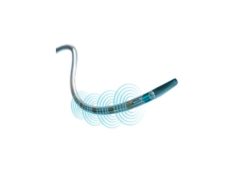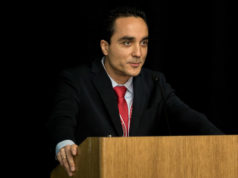
The one-year results of the ACCESS PTS trial have shown that EKOS therapy (BTG) statistically improves post-thrombotic syndrome scores and sequelae as well as quality of life outcomes. Presenting the data at the Charing Cross Symposium (24–27 April, London, UK) Mark Garcia (Wilmington, USA) said that these results mean that “hope is here for post-thrombotic syndrome patients who have failed standard of care therapy”.
Garcia maintained that the current standard of care for those suffering from chronic veno-occlusive disease and post-thrombotic syndrome, which includes anticoagulation, compression, elevation and when necessary, wound care, is simply not sufficient.
Therefore, the ACCESS PTS (Accelerated thrombolysis for post-thrombotic syndrome using EKOS) study was initiated. It is a prospective, multicentre study at 29 sites looking at symptomatic lower extremity deep vein thrombosis that was present for greater than six months. Patients had to have at minimum femoral deep vein thrombosis to be included in the study , while those with isolated iliofemoral deep vein thrombosis were excluded. The deep vein thrombosis had to be ultrasound documented for at least six months and patients were required to have failed a minimum of three months of conservative therapy— including therapeutic anticoagulation and compression—as well as a baseline Villalta score of ≥8.
The primary endpoints were a reduction of 4 on the Villalta scale at 30 days compared to baseline in at least 50% of patients and an increase in blood flow calculated by time to washout in the affected segments.
Seventy-eight patients (82 limbs) with mean deep vein thrombosis time of 13.2 months were included in the study.
Garcia reported that a 4 point reduction in the Villalta scale at 30 days was seen in 67% of the patients treated (p=0.003, confidence interval [CI] 95%). The overall Villalta results saw a mean improvement of 49% from baseline out to 365 days, and went from a mean baseline score of 15.5 (severe PTS) to 7.8 (mild PTS) at one-year (p< 0.0001). Similarly, the VCSS results showed a mean improvement of 42.7% from baseline at 365 days, from a score of 12 down to 6.9 (p< 0.0001). As for quality of life results, the VEINES-QOL found a mean improvement of 36.4% at 365 days with a baseline score of 61.1 that improved to 79.9 at 365 days.
Garcia reported that the safety endpoint was met, with only one major bleed related to anticoagulation, recurrent deep vein thrombosis in three patients, and pulmonary embolism in one patient within 30 days but after initial discharge home.
In conclusion, the ACCESS PTS study found that for patients suffering from chronic veno-occlusive disease and post-thrombotic syndrome, endovascular intervention using EKOS therapy is a safe and effective treatment for not only recanalising chronic venous occlusions, but also in reducing the post-thrombotic sequelae based on Villalta and VCSS scores as well as improving the patients quality of life.








